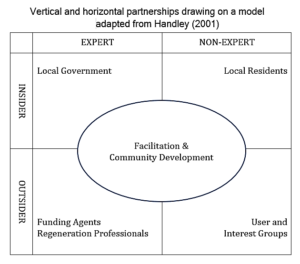Partnerships in Environmental Regeneration in North West England 1980 – 2010: a Practitioner Perspective
There is no longer any doubt that we are facing climate and ecological catastrophe if we fail to change our ways – and quickly. Scientists are agreed – from IPBES to IPCC , from Sir David Attenborough to Sir David King – that the window for action is short, but also that it is not just government, or business, or civil society who must act, but everyone together as they can; globally, nationally, regionally, locally.
As practitioners in the North West of England between 1980 and 2010, we believe that our experience of a now largely forgotten way of working has much to teach us today. Between 1970 and 2010, a three hundred year old legacy of industrial pollution of both land and water in the Mersey Basin and East Lancashire was successfully tackled. And a key element of that success was partnership working – both vertically, from the European and national to the regional and local, and horizontally, across and between sectors and communities locally – to bring about change.
Figure 1
At the heart of these efforts were facilitating and delivery charitable trusts set up for the purpose able to bring partners together, overcome difficulties and make things happen.
In our article in the latest issue of Voluntary Sector Review, Place leadership revisited: partnerships in environmental regeneration in North West England, 1980‐2010: a practitioner perspective, co-authored with John Handley, Peter Wilmers, Richard Sharland and Walter Menzies, to whose memory the article is dedicated, we introduce case studies of Groundwork and the Mersey Basin Campaign. Both were initiated by Michael Heseltine, who became Margaret Thatcher’s ‘Minister for Merseyside’ following rioting in Toxteth in 1981.
Heseltine had a strong belief in the value of partnership working, of the government, central and local, businesses, voluntary organisations, landowners and others working together to tackle environmental, social and economic dereliction. Operation Groundwork in St Helens and Knowsley began in 1982, widening out from a county council urban fringe and derelict land reclamation proposal and was spearheaded by a charitable trust whose core members were a central government agency and the local authorities in the area, with a private sector chair, cross sectoral Board and a small staff team charged with making things happen. A year later, five more Groundwork Trusts were established in the region on the same model, including Rossendale, the subject of the case study. By 2000, there were fifty trusts throughout the UK outside of Scotland. Key elements for success was an ethos of partnership with residents, communities, local businesses and so on, and a new approach to landscape remediation, adopting an ecological approach working with nature and using engineering solutions only when absolutely necessary.
Shocked by the state of the River Mersey, Heseltine also initiated the Mersey Basin Campaign in 1985 to clean up the whole catchment within 25 years. Initially led by a unit within the Government’s North West Regional Office, a Voluntary Sector Network, later the Mersey Basin (charitable) Trust, followed in 1987 and a Business Foundation three years later. With separate central organisations enabling, co-ordinating and supporting catchment and local action to improve water quality, regenerate the land alongside over 1,080 miles (1,735 km) of rivers in the Basin and to encourage communities and individuals to once again ‘value and cherish’ their waterways. By 2010 the Campaign had achieved its main objectives and voluntarily disbanded.
In the article we discuss some of the key elements of success, including:
- Simultaneous vertical and horizontal partnerships
- The challenge of scale in landscape
- Achieving sustainable outcomes
- Responding to institutional change
- Leadership and partnership working
Before briefly discussing some of the challenges of making the partnerships a success. We reflect on power, governance and opportunity, drawing on our own experience and some of the academic literature.
As already mentioned, the Mersey Basin Campaign wound down in 2010 and Groundwork, which is successfully supporting environmental social, economic and cultural action to this day, matured and both responded to external changes, for example New Labour’s ‘new managerialism’, the Coalition Government’s withdrawal from regional working and resolute pursuit of austerity, and changes in local government. Today Groundwork has developed new ways of working, enabling it to grow scale, impact and resilience and evolved other mechanisms to maintain strong local (‘horizontal’) partnerships.
We recognize that in many ways the world has changed in the last 20 years in government, in technology, in society and in the economy. But there are important lessons to be learnt from the drive to restore the environment of a whole region over three decades we describe.
The challenges of climate change and ecological breakdown can demoralize individuals and place leaders because they seem so unachievable. But Zero Carbon Britain ‘sets out the positive, connected approach we need to overcome them – joining up research and practice across disciplines, borders, sectors and scales’. We describe models of working – a visionary strategic framework coupled with community-level engagement through vertical and horizontal partnerships – that could be used to make these transitions possible. Does central government still have the vision and confidence in local partnerships to deliver fundamental environmental improvement? A new Mersey Basin Campaign for decarbonising the region, supported by government, and led by local government, business, NGOs, academics and community leaders, could energise and inspire a successful response within 25 years. It has been done before.
It would require a coherent policy framework, but the importance of charitable partnership organisations such as Groundwork or the former Mersey Basin Trust to act as enablers, brokers and champions for local action by all should not be underestimated. At a time when the Government is poised to commit to 78% de-carbonisation, we invite all stakeholders in this amazing planet we inhabit to come together to demand of Government the resources, leadership and freedom to allow such vertical and horizontal partnerships to be established at all levels; to become truly transformative – and quickly.

